Artificial intelligence (AI) continues to become more sophisticated with each passing day. That is why businesses are increasingly relying on AI and its dynamic capabilities to optimize the critical aspects of their business.
As per a recent report by IBM, global AI adoption is growing steadily, with 35% of companies now using AI in their business, a four-point increase from the year before. Moreover, about 44% of businesses are currently working on embedding AI into their applications and processes while 42% of companies are exploring AI adoption.
The report also highlights the key areas where organizations are using AI today.
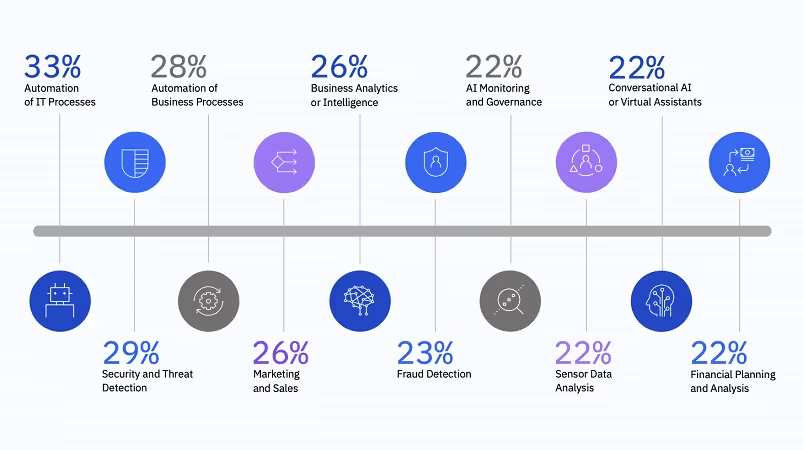
Ai has become more accessible than ever. small businesses use to believe that AI solutions are only for large enterprises, however, AI can be a powerful tool for driving sales irrespective of the business size.
AI continues to gain traction in ecommerce as well. When implemented, AI can resolve many real-world issues like increasing conversions, improving customer experience, and assisting in business management. It can help boost sales without you even lifting a finger, simplifying the job of your sales team.
So how can the average retailer tap into all this AI potential in order to boost sales and improve productivity? With AI automation tools, and they're more accessible and easier to use than you might expect.
How can AI help boost ecommerce sales, top use cases
Like other industries, ecommerce has quickly adopted AI to improve processes. Let's take a closer look at how AI is changing the way retailers do business.
Improve lead retargeting: AI makes it easy to retarget leads. It's no secret that ecommerce businesses create retargeting strategies to increase their consumer base. But most retargeting efforts rely on guesswork and luck. In other words, businesses can't be sure if their retargeting efforts will pay off or if the customers will convert.
This is where AI can play an important role. It can ensure that your marketing efforts and resources are not wasted on leads that would never convert. AI can supply valuable user data that can be used to build personalized communications and offers to guide a retargeted potential customer down your sales funnel.
Furthermore, businesses often have unmanageable customer data that they do little or nothing with. This is an incredible missed opportunity that AI can help leverage.
Decrease cart abandonment rates: Cart abandonment rates are usually very high, going as high as 69% on average. Even if consumers are ready to buy, they frequently abandon their carts.
However, to run a successful business, you need as few abandoned carts as possible. Fortunately, AI has a role to play in assisting you in this regard. It can automate follow-up queries for every abandoned cart.
It will also give you information on why your customers gave up the purchase when they were so close to converting. The issue could be with technology, payment options, delivery options, or hidden fee. This will help you remove any major roadblocks that might lead to your customers abandoning their carts, resulting in increased sales.
Improve customer experience: Customer experience is hands down one of the most essential components in increasing sales. Unhappy customers are unlikely to make a purchase from your store again and may even abandon it completely.
AI can help ecommerce businesses find effective solutions to improve customer experience. Moreover, through AI-powered chatbots, you can offer your customers quick query resolution, better site navigation, and personalized offers. All this improves the overall customer experience.
When it comes to offering satisfactory customer service, a simple virtual assistant powered by AI can make a big difference. These chatbots can help organizations save time and money while increasing sales.
Increase conversion rates: AI can provide fast responses and accurate suggestions, helping retain customers and increase conversion rates. It can work with swathes of data, analyze previous searches, and make personalized suggestions to customers to make shopping and product-finding easier for buyers.
It can also personalize messages and marketing campaigns.
Create a more efficient sales process: Integrating AI into your CRM can work wonders. Since AI systems enable natural language processing, it makes it easy to complete queries through voice search. A CRM can then answer customer queries, solve their problems, and help the sales team by identifying new opportunities.
Some retail companies like The North Face are using IBM's AI solution called Watson to deliver personalized experiences to customers by asking them relevant questions about the kind of product they want to purchase. Then it scans through hundreds of items to find the perfect product that matches the customer's preferences.
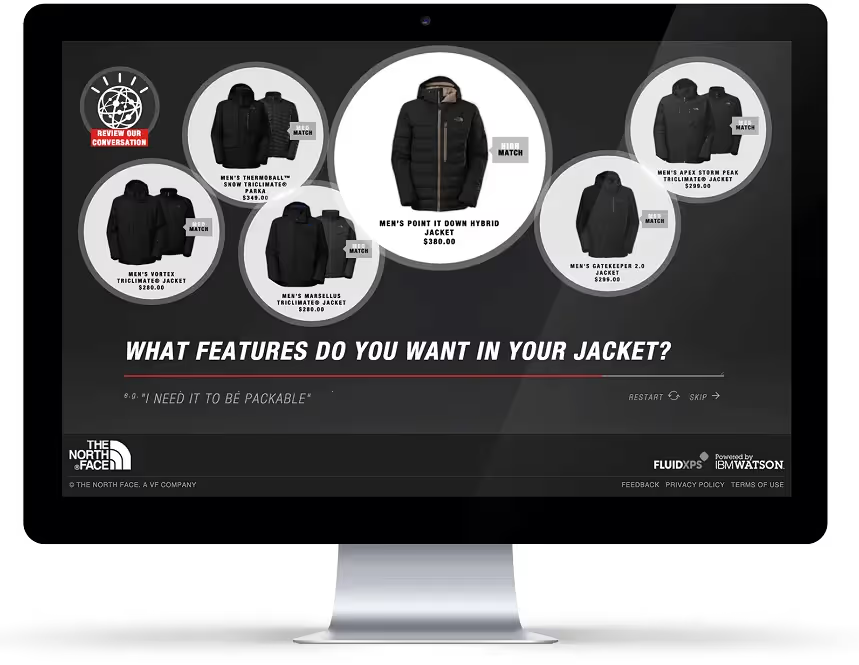
Give personalized product recommendations: Amazon has shown the world how personalized product recommendations can help boost sales as the company has been using AI-powered product recommendations for about two decades now.
Using AI, brands can search through petabytes of data and predict customer behavior. It can then offer relevant and helpful product recommendations to customers that are likely to boost sales.
Create a smarter, customer-centric search: AI helps ecommerce search engines think the way humans do. Since customers often abandon their purchases because the products displayed are not relevant to them, ecommerce companies are using AI to create smarter search engines.
Through natural language processing and advanced image and video recognition, developers are improving search engines. Thanks to machine learning, the AI software automatically tags, labels, and organizes different products for easier search.
Learn from past purchases and online browsing habits: Thanks to large amounts of user data available, ecommerce companies can use AI to tailor their customer experiences by leveraging the knowledge about past purchases and online browsing habits. This leads to better retention and conversion rates for customers.
Forecast future demands: Companies can use AI to analyze patterns like past purchases and customer shopping history to forecast future demands. AI analyzes the website's consumption patterns and anticipates inventory needs to forecast demand for products. This allows companies to restock their inventories in advance. This boosts efficiency, lowers costs, and improves business performance.
Automate tasks: Thanks to AI, online retailers and ecommerce sellers can focus on more targeted advertising and marketing instead of spending their time on manual, repetitive tasks. Through automation tools like chatbots or marketing tools, online businesses can automate tasks like offering discounts, customer support, product recommendations, follow-up emails, etc.
Virtual Dressing Rooms: AI in conjunction with other advanced technologies like AR and VR has made some remarkable developments to help people shop better from their homes. Virtual dressing rooms are among such interesting applications that allow customers to try out the products they want to purchase from the comfort of their homes.
Hyper-personalization and predictive analytics: The hyper-personalization of content isn't only limited to marketing communication like emails, notifications, or chat. It also applies to all types of information like dynamic websites, landing pages, or product pages. Adopting hyper-personalization means you increase your chances of making a sale as customers are more likely to respond to experiences that are targeted as per their preferences.
AI also powers predictive marketing, allowing businesses to leverage customer data like purchase history, website analytics, audience behavior, etc. to forecast the outcomes of marketing campaigns. This works in conjugation with hyper-personalization and helps boost sales.
Virtual shopping assistants: AI-powered virtual shopping assistants can help customers during shopping by making recommendations or sharing product details. Since these virtual assistants are powered by natural language processing, they are capable of interpreting what customers are saying in words or text.
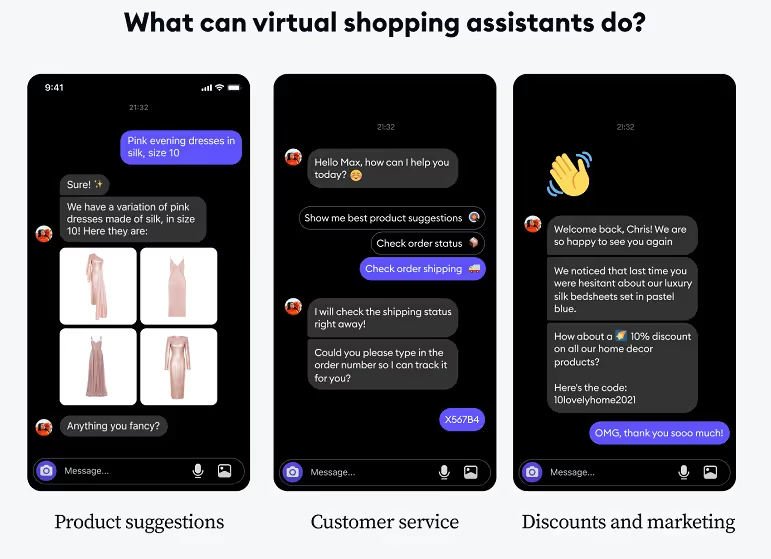
What’s evident from these use cases is that personalization is a common theme and AI has a big role to play in offering customers personalized experiences.
Data backs this claim too. As per Statista, about 70% of decision-makers in Europe and North America believe that AI will have the biggest role to play in personalization.

11 best AI tools to help you automate ecommerce
The market for AI-powered ecommerce solutions is expected to be valued at around $16.8 billion by 2030. So, let’s have a look at some of the most popular AI-powered automation tools for ecommerce that would help you boost sales without lifting a finger.
1. AiTrillion
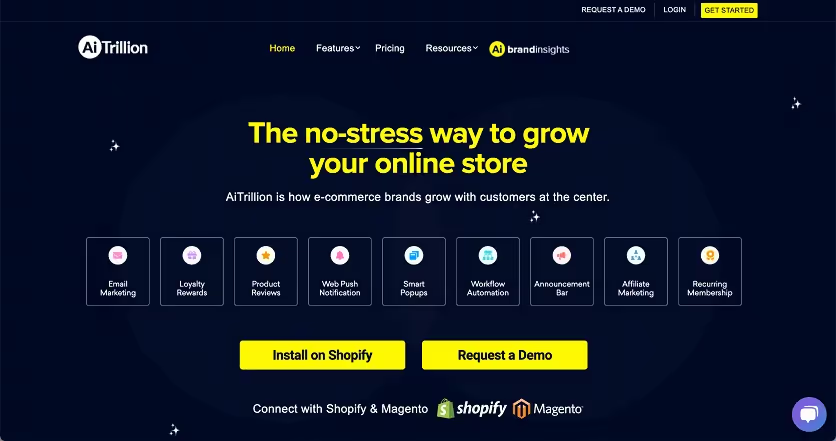
AiTrillion is a SaaS-based, AI-enabled, all-in-one marketing platform for ecommerce sellers. It's loaded with tools and insights to help ecommerce businesses grow.
Its suite of tools includes email marketing, live chat, customer review platform, workflow automation, and much more. Moreover, it integrates seamlessly with Shopify.
The solution uses AI to analyze customer data and create targeted segments while also finding hidden patterns that many traditional ecommerce platforms are unable to spot.
2. Gorgias
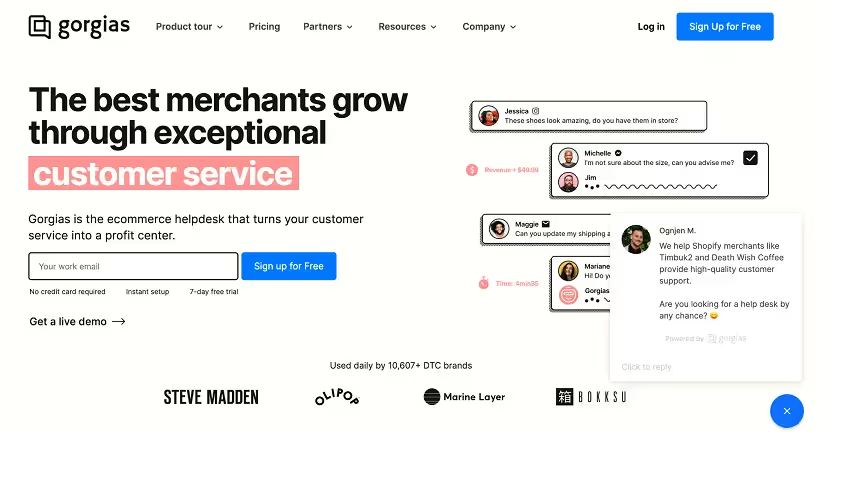
Gorgias is a highly rated help desk software for ecommerce merchants.
It allows retailers and online sellers to respond to customers’ questions like product queries in real-time without them leaving the site or abandoning their carts.
It also has an all-in-one dashboard that can be used to respond to customer comments and questions even from social media platforms along with the ecommerce website.
3. Proof
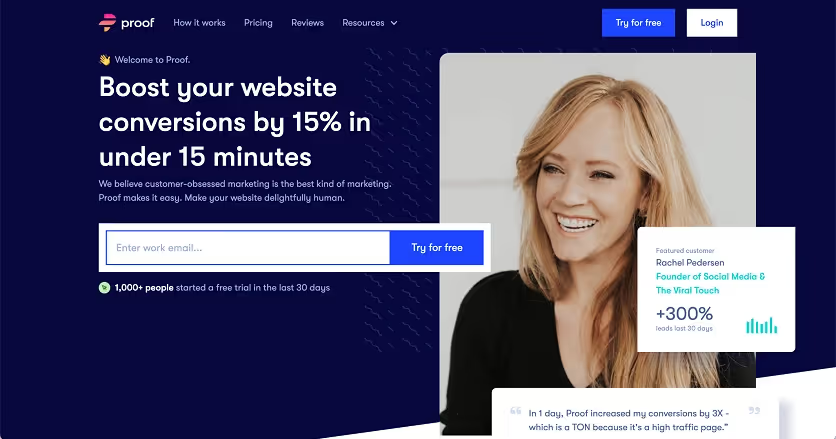
Proof offers real-time information on your high-traffic pages to build customer trust, build urgency, and boost conversions.
Among its top features is something called Hot Streaks which shows the total number of people who have recently taken action on your site. It also offers a live visitor count as well as a recent activity option to show a live feed of real people who recently took action on your site.
These are proven features that provide a significant boost to conversions by humanizing the web pages by showing other people's actions.
4. Seventh Sense

Seventh Sense is an AI tool that can help you ramp up your email marketing campaigns. It can also boost engagement on your ecommerce store.
This email delivery optimization solution is designed specifically for HubSpot and Marketo, allowing you to leverage AI capabilities while using the reporting features of your existing HubSpot or Marketo workflows.
Some of its key features include dispatch time optimization, email throttling, and email frequency optimization.
5. Granify

Granify offers quick and easy revenue optimization for your ecommerce store powered by machine learning.
The tool collects behavioral data points based on how your customers interact with your ecommerce store. These data points are then compared with billions of other customer behavioral patterns to calculate the probability of conversions.
By working like this, Granify can send your customers personalized messages when it identifies a conversion opportunity. This boosts the overall revenue by leveraging predictive analytics.
6. Namogoo
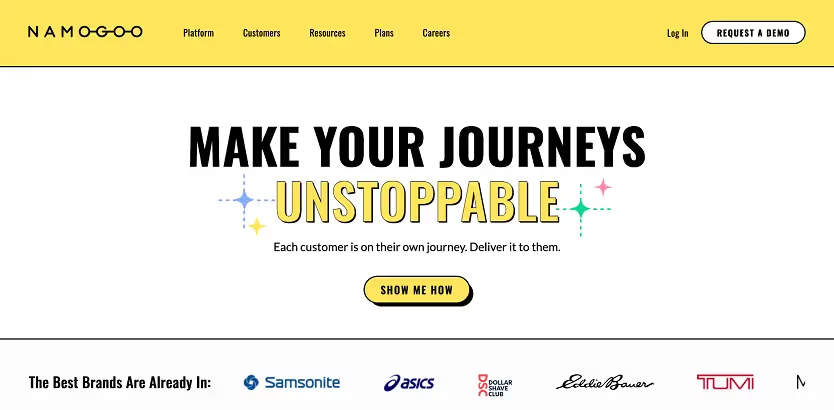
Namogoo is a digital journey continuity platform that uses machine learning to understand your customers and then deliver personalized promotions/offers.
Namogoo helps boost your ecommerce store revenue by identifying lost revenue opportunities through AI. It works not only on your website but also on your mobile app. It then removes any roadblocks and hesitations to smooth your customers' digital journey, allowing them to follow a clear and straight path toward the checkout.
Some of its key features include customer journey OS, intent-based promotions, personalized email & SMS, and customer hijacking prevention.
7. PriSync

PriSync is a useful tool that allows sellers to find their rivals' pricing, strategies, profit margins, and other such details. This helps increase sales and revenue.
You can simply add your product and then your competitors. Once done, your dashboard will start showing you the price shifts in the market. You can also find past price trends and export any data that you want.
8. Algolia
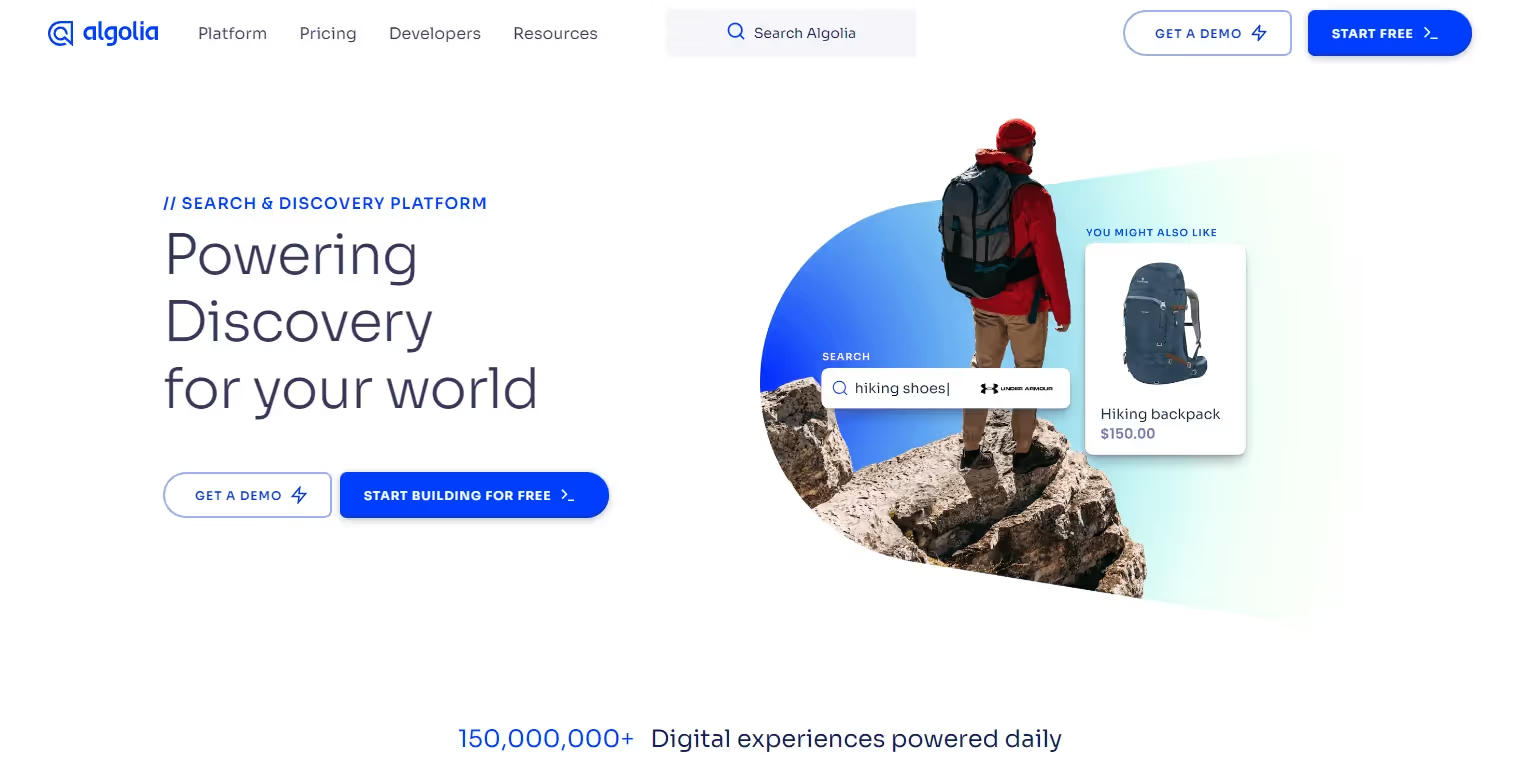
Algolia is a hosted search engine capable of delivering real-time results from the first keystroke. Algolia’s powerful API lets you seamlessly implement search within your websites, mobile, and voice applications. The Algolia search engine powers billions of queries for thousands of companies every month, delivering relevant results in under 100 ms anywhere in the world.
9. Visenze
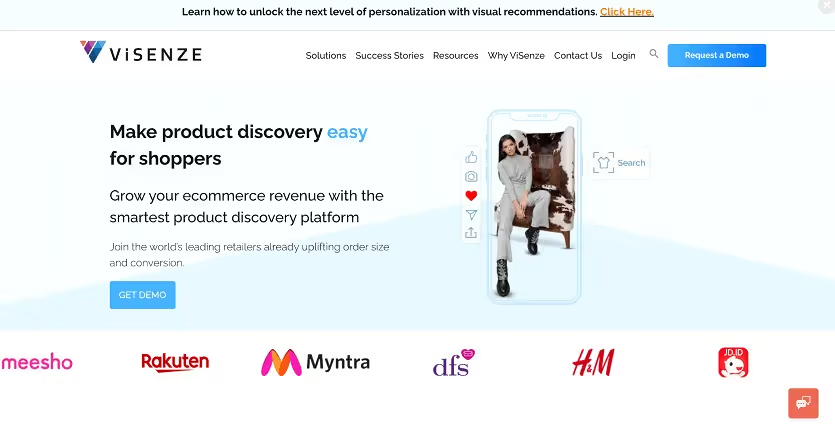
Visenze is an AI tool that increases the product discoverability of your ecommerce store, improving the way your customers find your product. It uses visual AI and a rich data catalog to make sure your customers don't flee your store because of not finding their desired product.
Visenze promises to improve visual search, increase conversion rates, and boost ROI. The tool not only offers good SEO and advanced search features but also contextual product recommendations and customer insights.
Moreover, it helps ecommerce sellers create highly relevant ads through contextual advertising. Some key features of this tool include smart recommendations, smart search, and smart tagging.
10. Liveperson

LivePerson is a conversational AI platform that helps improve brand-to-customer conversations through an AI-powered conversational cloud. Apart from improving conversations, it also makes it easy for customers to make a purchase through the messaging channels that they are comfortable using in their day-to-day life.
11. Phrasee

Phrasee is an AI tool that helps you leverage AI-powered content. Through its real-time content optimization, the tool increases engagement across the entire customer journey.
It helps you optimize your brand language and create a very personalized and connected customer journey that boosts sales. Through personalized marketing content, you can create brand awareness, improve your social following, and decrease your bounce rate.
A final word on using AI in ecommerce
Today, many companies that engage in ecommerce use AI for repetitive daily tasks such as customer service, shipping, and managing sales. This not only allows them to focus on higher-level tasks to improve productivity, but it also allows the company to stop devoting countless hours to the management of lower-level tasks.
If you still devote countless man-hours to the execution of repetitive tasks, then right now is the perfect time to consider employing any of the automation tools we have listed above.




.png)


